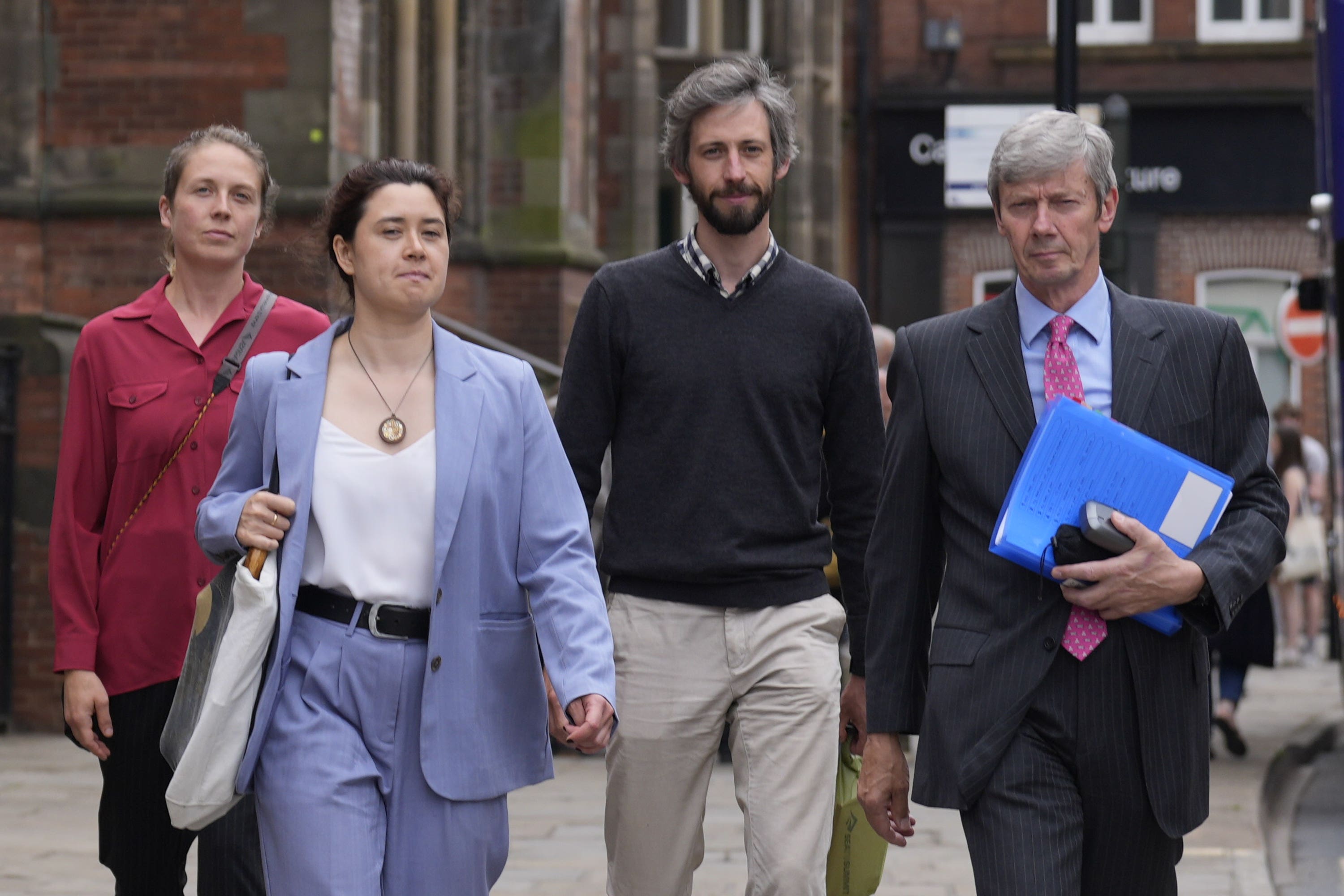Judge throws out charges against Greenpeace activists who scaled Sunak’s home
The four protesters had been accused of damaging roof tiles at the former prime minister’s North Yorkshire mansion.

A judge has thrown out criminal damage charges against four Greenpeace activists who scaled Rishi Sunak’s constituency home and draped it in black fabric, ruling that the evidence was too “tenuous” for them to be convicted.
Amy Rugg-Easey, 33, Alexandra Wilson, 32, Mathieu Soete, 38, and Michael Grant, 64, had been accused of damaging 15 roof slates during the five-hour demonstration at Mr Sunak’s North Yorkshire mansion last August.
Prosecutors said the former prime minister and his wife Akshata Murty were left with a bill of just less than £3,000 for repairs at the house in Kirby Sigston, near Northallerton.
The defendants’ trial started in July, but after the prosecution closed its case defence lawyer Owen Greenhall submitted that there was no case to answer as it could not be proved the roof damage was caused during the protest.
Giving his decision on Friday, District Judge Adrian Lower said he had concluded the evidence against the defendants was “so tenuous” that no court would convict them. He said he would deliver a full ruling on November 11.
The trial heard that Malcolm Richardson, a foreman and experienced roofer with an ongoing contract to carry out work at the Murty-Sunak house, was called to inspect the roof after a police officer investigating the protest said he believed there had been some damage caused.
Mr Richardson said he was asked to inspect only the area where he was told the protesters had been, and identified 15 tiles that would need to be repaired.
He said in a statement to police that he could tell the damage was recent because of “weathering and colouration”.
Pictures taken by Mr Richardson were used by prosecutors, who said it could be seen “that the location of the damage corresponds to the locations where the defendants went”.
During Mr Richardson’s evidence, it was found that three of the 15 pictures used by the prosecution were actually of the same tile taken from different angles, and some had been taken after Mr Richardson had moved the tiles to carry out the repairs in November.
Mr Greenhall, defending, said there appeared to be cracks to tiles in parts of the roof where the protesters had not gone.
Applying for the case to be thrown out, Mr Greenhall said the prosecution relied on Mr Richardson’s ability to date the cracks, and that his method was “not that reliable”.
He told the court Mr Richardson was only asked to look in one area when “what should have been done is an examination of the entire roof”.
“It’s clear this is a roof where there is pre-existing damage in areas where the protesters did not go. This is not a pristine roof by any means,” he said.
“The simple fact that there are cracks in the tiles on the southern elevation by itself cannot be enough to get over the criminal standard that the defendants are responsible for it.”
He told the court that Mr Richardson’s business relationship with the Murty-Sunaks and responsibility for repairs at their house meant he “could not be described as being independent” and that an independent surveyor should have been called in.
During the trial, the Sunak family’s personal chief of staff Scott Hall said the property was “well-maintained” and staff “would have been aware of any damage to the roof”.
We have become a country that regularly sends peaceful protesters to jail, with some facing years behind bars for trying to preserve a habitable planet for us all. This has to stop
In cross examination by Mr Greenhall he agreed there did appear to be some cracks in areas of the roof away from the protest that he had not been aware of, and that some of the window frames appeared to have peeling paint.
York Magistrates’ Court heard Mr Sunak, Ms Murty and their two daughters had left for their summer holiday and were not at home during the protest, but staff at the property were “shocked” to find Greenpeace activists in the grounds on the morning of August 3.
Speaking outside court, one of the defendants, Michael Grant, said: “Justice and common sense prevailed in court today, but that hasn’t been the case for many activists recently.
“We have become a country that regularly sends peaceful protesters to jail, with some facing years behind bars for trying to preserve a habitable planet for us all. This has to stop.
“Peaceful protest is a vital part of our democracy – it gave us votes for women, the right to a weekend, and bans on commercial whaling and fracking.”
He said the activists had targeted Mr Sunak’s home because it was a “personal” decision for him to issue new fossil fuel licences, and that they had made sure the family were not at home before the protest.
Bookmark popover
Removed from bookmarks